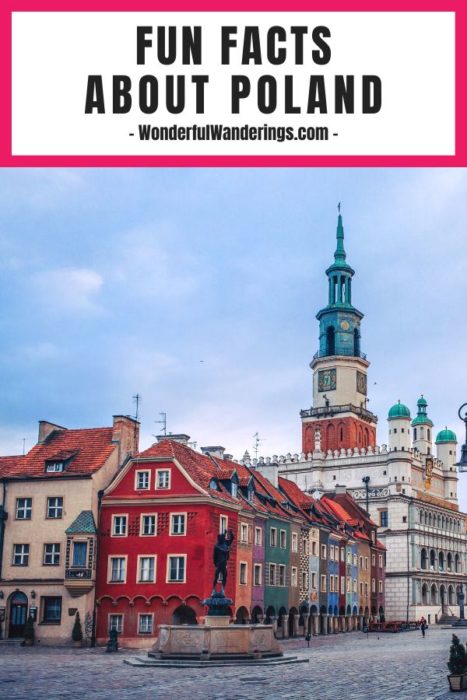How many fun facts about Poland do you know?
Did you know that one of the world’s favorite spirits originated in Poland? What about the fact that it is home to the heaviest animal on the planet? Are you aware of how many bird sanctuaries exist in Poland?
If these fun facts about Poland are news to you, then you need to keep reading so you can foster a new appreciation for this fascinating country.
Historical Facts About Poland
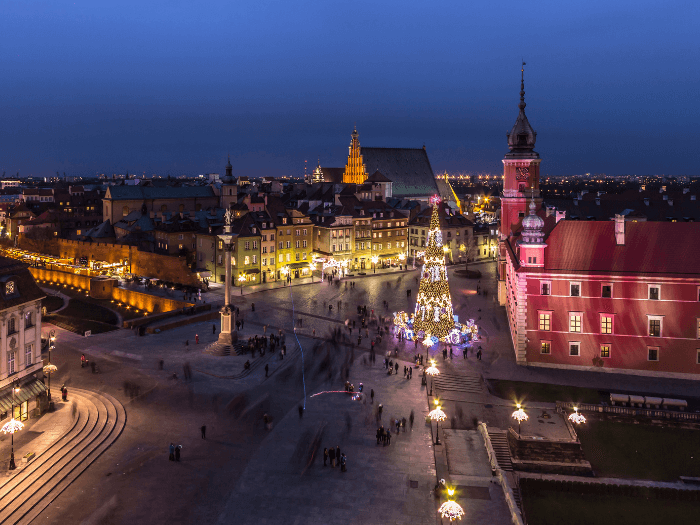
1. Poland is home to 15 UNESCO World Heritage Sites. Some of the most prominent include the Wieliczka Salt Mine, Auschwitz Birkenau, the Bialowieza Forest, and the old town of Warsaw.
2. More sites are on the tentative list, including the Paper Mill in Duszniki-Zdroj and the Old Town of Gdansk.
3. Another UNESCO World Heritage Site is the Castle of the Teutonic Order in Malbork. It is the world’s largest castle by land area and was initially built in the 13th century as a Teutonic castle and fortress. It has since been restored and now serves as a museum. It is a popular attraction when tourists visit Poland.
4. The Wieliczka Salt Mine is one of the world’s oldest salt mines. Its history dates back to the 13th century. Located in Krakow, Wieliczka is the only mining site that has been operating since the Middle Ages. The mine has produced sculptures, chandeliers, and a chapel carved from rock salt.
5. If you find yourself in Wroclaw, you should visit the Piwnica Świdnicka. It’s the oldest restaurant in Europe and serves the same delicious dishes that it did when it first opened in 1273. The menu features Polish food, and the decor has a rich history and charming atmosphere.
6. You might have learned that the Old Town in Warsaw was heavily bombed and completely destroyed by Nazi Germany during World War II. The Polish government rebuilt it using detailed paintings by Bernardo Bellotto.
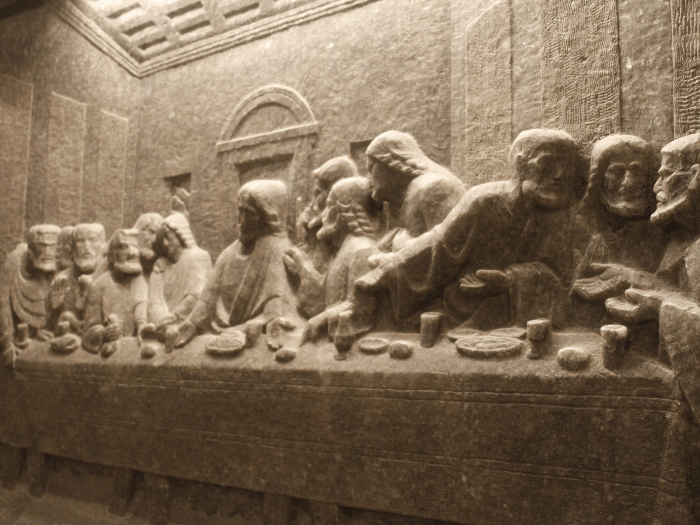



7. The Old Town of Warsaw is another UNESCO World Heritage Site and a popular spot to view buildings that date back to the 14th century.
8. One of the nine remaining copies of the Gutenberg Bible in its original 15th-century binding is in the Diocesan Museum in Pelplin. The Gutenberg Bible was the first major book created using a printing press. It helped pave the way for the mass production of books in the West.
9. One of the more interesting Poland facts is the origin of its name. It comes from the western ancient Slavic tribe Polanie, meaning “the land of fields.” The tribe inhabited the region in the 6th century and gave the country its name.
10. The Polish Constitution, adopted in 1791, was the second fundamental law in Europe after the American Constitution. It helped establish the principles of political equality and the protection of individual rights.
11. For 123 years, Poland didn’t exist on world maps. This was due to partitions by Russia, Prussia, and Austria. These occurred in the late 18th century and divided Poland among its neighboring countries. It finally regained its independence after World War I.
12. Poland is the birthplace of many historical figures. One of the most important is the astronomer Nicolaus Copernicus. He came up with the concept of a heliocentric solar system and was the first person to propose that the Sun is at the center of the universe instead of the Earth.
13. Another historical figure is Pope John Paul II. Born in Wadowice, Poland, in 1920, he was the former head of the Catholic Church. In 1978, he became Pope John Paul II and served for over 26 years.
14. The world’s tallest structure, the Warsaw radio mast, was once located in Poland until it collapsed in 1991.
15. Genizno was the first Polish capital before changing to Krakow in 1038. Today, Warsaw is the capital of Poland.
Interesting Facts About Poland
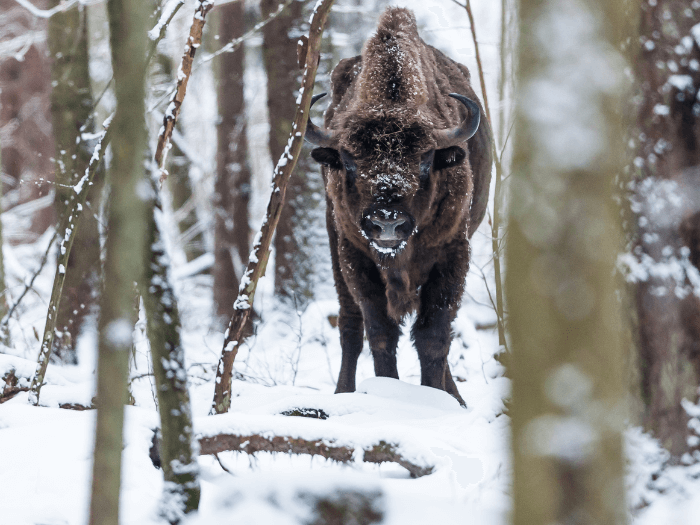



16. Poland is the ninth largest country in Europe based on area and shares its borders with seven other countries, including Russia and Germany.
17. Vodka was invented in Poland. The first recorded mention of this
traditional Polish alcohol was found in court documents from 1405. Polish vodka
was initially used as medicine. The country continued distilling it through the Middle Ages; today, more than 50 million gallons are produced annually.
18. Despite not having an official religion, Poland is a religious country. Only 3% of the population stated they have no affiliation with any religion. More than 90% of Polish people are Catholic.
19. The Polish language is known for featuring very complex grammar and spelling. It incorporates many challenging sounds that are not present in most other languages.
20. Another interesting fact about the Polish language is that surnames differ depending on the gender of the individual. Polish surnames might end in -ski or -ska or even -cki or -cka, depending on the gender of the person.
21. One of the more peculiar facts about Poland is that it is home to the heaviest land animal in Europe. The endangered European bison, also known as the wisent, weighs over 90 stone on average. They can be found in the Białowieża Primeval Forest, which is also the last primeval forest in the European Union.
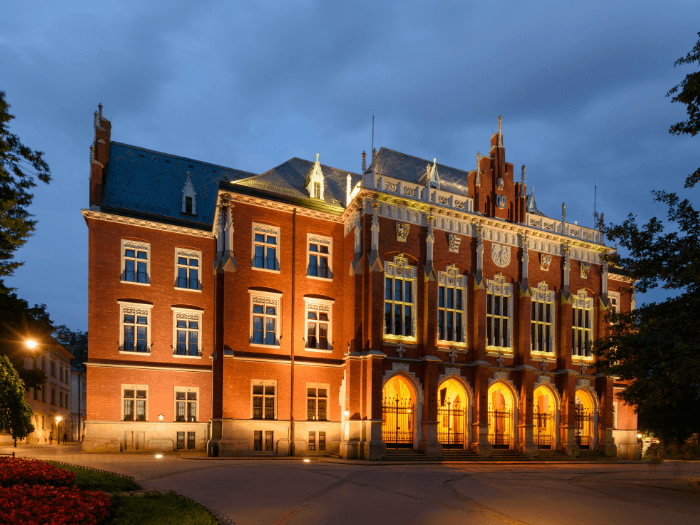



22. Poland features ancient forests and mountain chains like the Tatra
and Carpathian. It also includes the only Central European desert, the Pustynia Błędowska.
23. Polish people can access free higher education. They can attend one of over 500 colleges in the country without paying any fees to study.
24. The Jagiellonian University is Poland’s oldest university. It was founded by Polish kings in 1364. International students are welcome, but they will need to pay a small amount to attend.
25. Poland is home to many inventors. Some of the most prominent objects Poles have helped create include the bulletproof vest, walkie-talkie, and paper clips.
26. Marie Curie, one of the country’s most famous scientists, was the first woman to win a Nobel Prize. She is also the only person to win it twice and to earn a Nobel Prize in two different sciences.
27. Poland has had many Nobel Prize winners across multiple categories, including literature, peace, physics, and chemistry. Henryk Sienkiewicz, Joseph Conrad, and Frederic Chopin are just some of the notable Polish people to achieve this honor.
Fun Facts About Poland




28. Ever wondered what an upside-down house looks like? You can see yourself in Poland. Located in the small village of Szymbark, the world’s first upside-down house home was built in 2007 by Polish businessman and philanthropist Daniel Czapiewski.
29. Poland boasts one of the largest open-air music festivals in Europe. Oh, and it’s free! The Pol’and’Rock Festival, formerly the Woodstock Festival, is held every summer in Kostrzyn nad Odrą, near the German border. It started in 1995 and today has an average attendance of more than 600,000 people.
30. Traditional Polish beers are mixed with fruit syrup. Raspberry is the most popular choice. But you have other options like cherry and blackcurrant. It’s also popular to warm up a beer and add cinnamon and cloves to create a spiced beverage.
31. One of Warsaw’s most iconic landmarks, The Palace of Culture and Science, features more than just conference rooms and offices. You’ll quickly notice that there are dozens of cats roaming the building.
32. Mushroom foraging is popular in Poland. It’s most common in the autumn months when the forest floors are covered in a colorful array of wild mushrooms. Polish children are taught from a young age how to identify the various species and which edible mushrooms are safe.
33. On the Polish calendar, every day of the year is marked with a specific male and female name. It’s celebrated just like birthdays. This Polish tradition sees people receive gifts such as flowers or alcohol from friends and family. Polish citizens even take the day off work or school to celebrate their name day.
34. Speedway, a type of motorcycle racing, is one of the most popular sports in Poland. The Polish Extraleague includes teams from all over the country and often features tens of thousands of spectators filling the stands at every event.
35. Another popular sport in Poland is volleyball. The national team has won multiple gold medals in European championships. The Polish men’s team is considered one of the best in the world, and the women’s national team is also highly successful.
36. The bird population in Poland features hundreds of different species. There are more than a hundred bird sanctuaries across the nation. These sanctuaries are managed by the Polish Society for the Protection of Birds (OTOP), which aims to protect endangered species and preserve their natural habitats.
37. Kupała is an annual festival where Polish men light bonfires and jump over them. They believe it cleanses them of their sins and brings good luck. Women also make wreaths from flowers and herbs, which they release into the river in the hope of finding love and happiness.
38. Wianki is another annual festival Poles celebrate. The event has pagan roots and is associated with the summer solstice and the fertility of the earth. Wianki is a popular cultural event in Poland and is celebrated in many cities across the country.
39. There are even some interesting facts about Polish pizza. The dish is made with a baguette sliced in half and topped with ingredients such as cheese, mushrooms, and even ketchup. It is then baked until the cheese is melted and bubbly.
The dish originated in the 1970s and was created as a cheap and filling meal for students. Today, zapiekanka can be found at food trucks and stalls across Poland, particularly in large cities like Warsaw and Krakow.
40. Błędów Desert in Poland has the largest buildup of loose sand away from the sea in Central Europe. Due to this fact, it has been given the nickname of the Polish Sahara.
41. Kissing a woman’s hand is a common practice in Poland today. It is considered a sign of deep respect and friendship and is more customary compared to sharing a hug or a handshake.
How Many Cool Facts About Poland Did You Know?




From Polish history during World War II to upside-down houses, there are many interesting facts about Poland that are worth learning more about. You can lose hours in your day learning all the fun facts about its fascinating history, whether it be about the oldest restaurant in Europe or the world wars it has been a part of.
The official language is just as intriguing. Whether it’s the surnames that differ based on gender or the Polish name days, which are just festive as birthdays, there is no shortage of interesting facts about Poland to learn.
PIN FOR LATER
